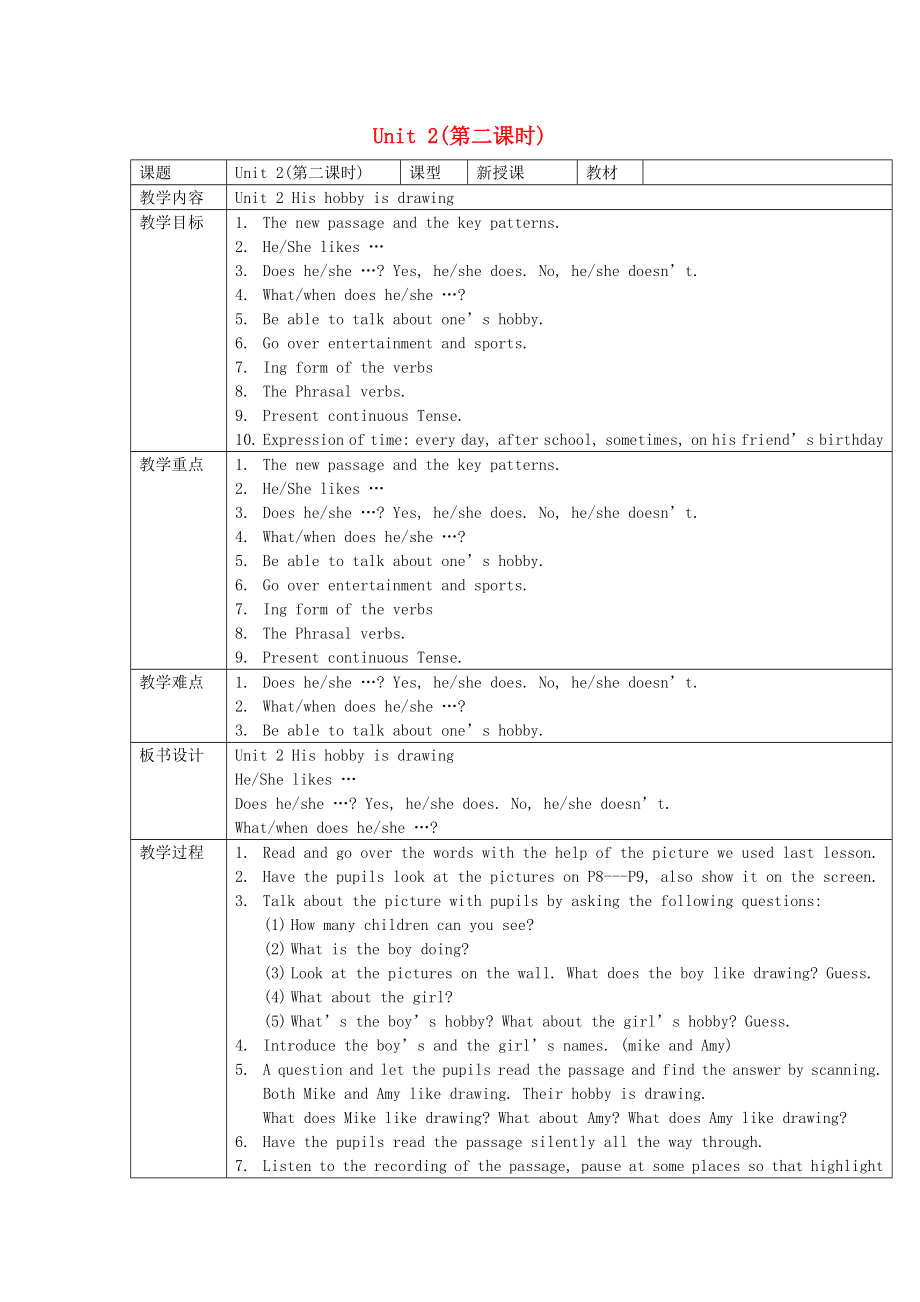《五年級(jí)英語(yǔ)上冊(cè) Unit 2 His hobby is drawing(第二課時(shí))教案 教科版(廣州三起)》由會(huì)員分享,可在線閱讀���,更多相關(guān)《五年級(jí)英語(yǔ)上冊(cè) Unit 2 His hobby is drawing(第二課時(shí))教案 教科版(廣州三起)(2頁(yè)珍藏版)》請(qǐng)?jiān)谘b配圖網(wǎng)上搜索���。
1、Unit 2(第二課時(shí))
課題
Unit 2(第二課時(shí))
課型
新授課
教材
教學(xué)內(nèi)容
Unit 2 His hobby is drawing
教學(xué)目標(biāo)
1. The new passage and the key patterns.
2. He/She likes …
3. Does he/she …? Yes, he/she does. No, he/she doesn’t.
4. What/when does he/she …?
5. Be able to talk about one’s hobby.
6. Go over entertainment a
2�、nd sports.
7. Ing form of the verbs
8. The Phrasal verbs.
9. Present continuous Tense.
10. Expression of time: every day, after school, sometimes, on his friend’s birthday
教學(xué)重點(diǎn)
1. The new passage and the key patterns.
2. He/She likes …
3. Does he/she …? Yes, he/she does. No, he/she doesn’t.
3、
4. What/when does he/she …?
5. Be able to talk about one’s hobby.
6. Go over entertainment and sports.
7. Ing form of the verbs
8. The Phrasal verbs.
9. Present continuous Tense.
教學(xué)難點(diǎn)
1. Does he/she …? Yes, he/she does. No, he/she doesn’t.
2. What/when does he/she …?
3. Be able to talk abo
4��、ut one’s hobby.
板書設(shè)計(jì)
Unit 2 His hobby is drawing
He/She likes …
Does he/she …? Yes, he/she does. No, he/she doesn’t.
What/when does he/she …?
教學(xué)過(guò)程
1. Read and go over the words with the help of the picture we used last lesson.
2. Have the pupils look at the pictures on P8---P9, also show it
5���、on the screen.
3. Talk about the picture with pupils by asking the following questions:
(1) How many children can you see?
(2) What is the boy doing?
(3) Look at the pictures on the wall. What does the boy like drawing? Guess.
(4) What about the girl?
(5) What’s the boy’s hobby? What about the
6��、 girl’s hobby? Guess.
4. Introduce the boy’s and the girl’s names. (mike and Amy)
5. A question and let the pupils read the passage and find the answer by scanning.
Both Mike and Amy like drawing. Their hobby is drawing.
What does Mike like drawing? What about Amy? What does Amy like drawing?
6
7��、. Have the pupils read the passage silently all the way through.
7. Listen to the recording of the passage, pause at some places so that highlight the language items necessarily.
8. Ask Pupils to read the passage after T/ recording.
9. Read the passage aloud for times in various ways.
10. Further learning about the sentences.
教學(xué)反思
 五年級(jí)英語(yǔ)上冊(cè) Unit 2 His hobby is drawing(第二課時(shí))教案 教科版(廣州三起)
五年級(jí)英語(yǔ)上冊(cè) Unit 2 His hobby is drawing(第二課時(shí))教案 教科版(廣州三起)

